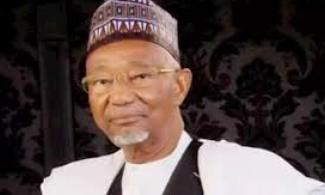
The ruling All Progressives Party APC Senator, in an interview on Channels TV on Tuesday, monitored by SaharaReporters, said Malami dragged the National Assembly to court in the name of the President and himself because the Electoral Act did not favour him.
Adamu Bulkachuwa, the lawmaker representing Bauchi North senatorial district in the Nigerian Senate, has accused the Attorney-General of the Federation and Minister of Justice, Abubakar Malami, of discouraging President Muhammadu Buhari from signing the amended Electoral Act.
The ruling All Progressives Party APC Senator, in an interview on Channels TV on Tuesday, monitored by SaharaReporters, said Malami dragged the National Assembly to court in the name of the President and himself because the Electoral Act did not favour him.

Bulkachuwa said, “The first Act we gave Mr President, he returned it with an amendment so if he had signed that one everything would have gone normal.
“But we think he was influenced by the Minister of Justice, who I think believed that the Electoral Act doesn’t favour him personally.
“So he advised Mr President not to sign and send in an amendment and we have cooperated with Mr. President all through from 2019 till date and so we thought Mr President brought in an amendment and we looked at the amendment and said ‘okay, let it be’. So, we fashioned it along his amendment and sent it back but sooner did we do that the same minister who advised him to sign now went to court in the name of the president and himself.”
Confirming his statement that Malami influenced Buhari not to sign the amended Electoral Act, the senator said, “Yes, the attorney general.”
SaharaReporters had in several reports detailed how Malami had schemed to ensure Section 84 (12) of the Electoral (Amendment) Act, 2022 was expunged because of his political ambition.
The law bars political appointees like Malami from seeking elective public office or voting as delegates in a party primary unless they resign their positions. Meanwhile, Malami was planning to contest for governor in his state – Kebbi.
For instance, he and Buhari had dragged the National Assembly before the Supreme Court over the section of the Electoral Act.
Buhari while signing the amended bill into law on February 25 had urged the parliament to expunge Clause 84(12) of the Act.
The clause reads, “No political appointee at any level shall be a voting delegate or be voted for at the convention or congress of any political party for the purpose of the nomination of candidates for any election.”
In March, both chambers of the National Assembly rejected the President’s request to amend the clause in the electoral act.
Subsequently, the Attorney-General boasted that the Nigerian government would consider all other options available before taking a position on the matter.
In the suit marked SC/CV/504/2022 and filed on April 29, 2022, with the National Assembly as the sole Defendant, Buhari and Malami sought an order of the court to strike out the section of the Act, which they said was inconsistent with the nation’s constitution.
The duo told the apex court that the Section 84 (12) of the Electoral (Amendment) Act, 2022 is inconsistent with the provisions of sections 42, 65, 66, 106, 107, 131, 137, 147, 151, 177, 182, 192 and 196 of the Constitution of Federal Republic of Nigeria, 1999, (as amended), as well Article 2 of the African Charter on Human and People and Peoples Rights.
However, the Supreme Court last Friday dismissed the suit filed by Buhari and Malami to void the provisions of Section 84(12) of the Electoral Act, 2022.
In its ruling, the Apex Court held that Buhari, having assented to the Electoral Bill on February 25, 2022, had no power to challenge the legality of the Electoral Act.
Justice Emmanuel Akomaye Agim held that the action of Buhari in instituting the case was declared as a gross abuse of court.
The Court upheld Kayode Ajulo's preliminary objection that the President cannot approbate and reprobate at the same time and that Buhari had no power under any law to dictate to the National Assembly on law-making.
Speaking on the chances of Bola Tinubu, the APC presidential candidate in the 2023 election, Bulkachuwa said the possibility of Tinubu winning the election is not certain yet because the person he picks as his running mate will be an important factor.
“It depends on circumstances; one is still his running mate, the one that is now warming the seat everybody including Tinubu himself know that he’s not the real running mate so we wait and these are some of the circumstances that will determine whether he will win or not.
“The running mate will make a lot of difference,” he said.